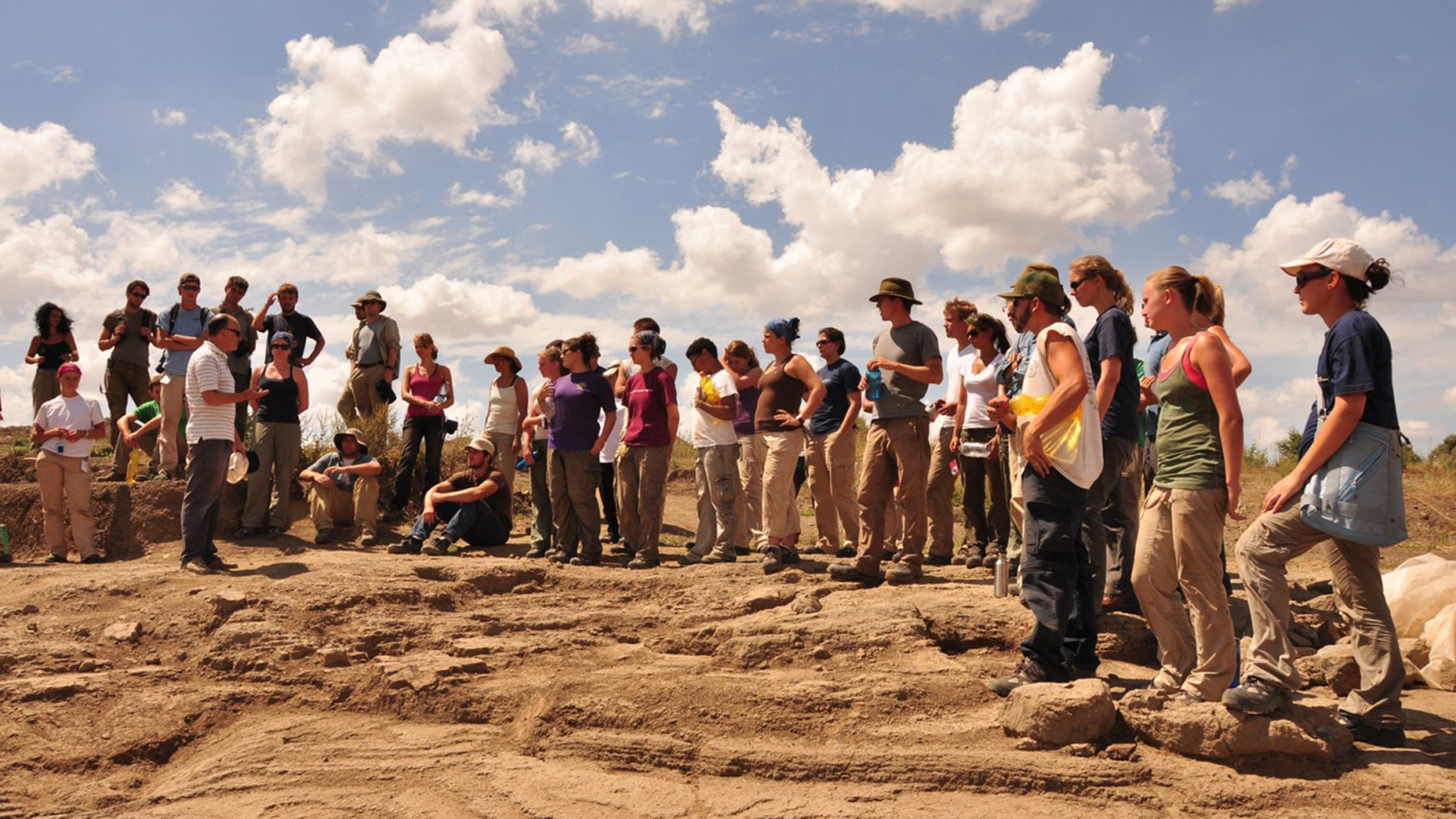
Gabii Archaeological Project
Gabii is a Latin city that is preserved practically intact and has been only minimally investigated. The goal of the Gabii Project is to reconstruct the millenary vicissitudes of this major urban site, from the dawn of the historical era to the medieval period, through the combination of excavation and various prospection techniques. Ultimately, the results of this research may change current models of the development of Roman cities by elucidating the factors that determined their growth and decline. At the same time, the project will lead to the rehabilitation of an area on the periphery of Rome enveloped by urban sprawl that has made no provisions for green areas and sites of collective memory.
Research, valorization, and social impact, therefore, are the principal aims of the Gabii Project. Uncovering a Roman city that is completely unknown will allow for a detailed understanding of its developmental trajectory, which will then serve as an indicator for other urban centers whose deep layers are much harder to access. The data collected will also aid in the conservation of the remains and their display to the public in an effort to promote and develop knowledge of the local cultural heritage. Last but not least, a key objective is to train a new generation of young American and Canadian archaeologists, so that they may acquire a practical knowledge of central Italy from a historical and cultural perspective.
Under the direction of Nicola Terrenato from the University of Michigan, the Gabii Project began in 2007–8 with a geophysical survey of approximately forty hectares of the city’s urban center. The results revealed evidence of a previously unknown urban grid within the line of Gabii’s ancient walls. It was on this basis that major excavations commenced in June 2009, sampling a portion of five contiguous city-blocks with multiphased occupation. This phase of excavation will continue through at least 2014.
Publication
Rachel Opitz, Marcello Mogetta, and Nicola Terrenato, eds., A Mid-Republican House from Gabii (Ann Arbor: University of Michigan Press, 2016).
Website
Blog
Social Media
Pompeii Archaeological Research Project: Porta Stabia
Through cutting-edge, interdisciplinary approaches to Roman urbanism, the Pompeii Archaeological Research Project: Porta Stabia (PARP:PS) is conducting excavations on a scale never seen at Pompeii. The project’s goals are to reveal the structural and social relationships between working-class Pompeian households, to determine the role that subelites played in the shaping of the ancient city, and to register their response to city and Mediterranean-wide historical, political, and economic developments. The project is based in the Department of Classics at the University of Cincinnati, under the direction of Steven Ellis (2013 Fellow, 2016 Affiliated Fellow).
For more information, please visit https://classics.uc.edu/pompeii/ or write to steven.ellis [at] uc.edu (steven[dot]ellis[at]uc[dot]edu).
American Excavations at Morgantina: Contrada Agnese Project
A part of the larger American excavations ongoing at the city of Morgantina (Sicily), the Contrada Agnese Project (CAP) is an ongoing, multiyear research and excavation project designed to investigate developments in the urban center between the third and first centuries BCE. CAP’s broader goals include elucidating material aspects of the ancient city’s nonelite population and investigating socioeconomic transformations in the city during the Hellenistic and Roman Republican periods.
The current focus of the CAP excavations is a modest house of Hellenistic date that is located at the western edge of the city. By introducing new research questions, methods, and technologies into our fieldwork, we aim to produce a vibrant picture of this domestic space, casting light on aspects of daily life such as food consumption, household industry, and economic exchange. In addressing the lived experience of those who dwelt in the ancient city, a focus on food and diet is of critical importance and so the CAP team is undertaking a comprehensive program of environmental collection and analysis—the first of its kind to be carried out at Morgantina. It promises to dramatically enrich our understanding of the city and its surrounding territory.
The CAP research and excavation program began in 2013 under the direction of Alex Walthall from the University of Texas at Austin (2013 Fellow) and will continue through 2018, after which we will move fully into the publication phase of the project.
For more information, check out themagazzino.org or write to dwalthall [at] austin.utexas.edu (dwalthall[at]austin[dot]utexas[dot]edu).
Regia Revisited
The Regia site has a crucial importance not just in the context of Rome, but in classical archaeology as a whole. Excavated at different times by a number of prominent archaeologists, including Giacomo Boni and Frank Brown, this site has never been the object of a systematic, analytical publication that presented all the available data in an organized and relational way. Its extremely complex sequence extends from the Iron Age to the medieval period in a relatively compressed vertical space, requiring a careful subdivision in phases and a three-dimensional consideration of reuses, cuts and superimpositions.
The Regia Revisited project envisions a full reconsideration of all the archival information available, including that of the early excavations as well as the Brown archive held at the American Academy in Rome. The publication in 2013 of the Boni journals offers a valuable opportunity of integrating the results of each different excavation at the site, an approach which is especially important for its later phases. The excavation materials will also be restudied in situ, updating and complementing the existing detailed archival record. The entire data set will then be reinterpreted and the phases presented sequentially in a definitive mixed-media publication.
P. Brocato, N. Terrenato, eds., 2017, Nuovi studi sulla Regia di Roma, Cosenza, Pellegrini.
Project Directors: Paolo Brocato (Università di Calabria) and Nicola Terrenato (University of Michigan).
Contact: Paolo Brocato at paolo.brocato [at] tin.it (paolo[dot]brocato[at]tin[dot]it).